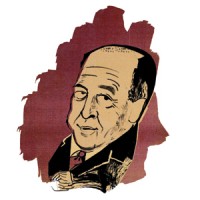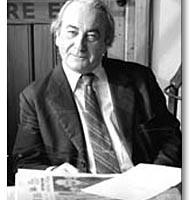Underrated: C.S. Lewis, by Judith Wolfe
Children’s books and popular presentations of Christian belief are what C.S. Lewis, who died 50 years ago this month, is best known for. But what makes him a favourite for earnest Christians’ christening and confirmation gifts — undaunted supernaturalism and doctrinal conservatism combined with an enticing rhetoric of certitude — makes him distasteful and a little suspicious to us intellectuals: “Mr Lewis is always clever” is the usual snub in Oxford Senior Common Rooms.
A.N. Wilson, in what is still the most widely read biography of Lewis, tries to dispel the magic by meticulously mapping Lewis’s intellectual development onto a well-worn Freudian chart of childhood trauma, repressed sexuality and frustrated ambition. But the diagnoses don’t really stick. There is no doubt, for example, that his mother’s death from cancer when he was nine left an indelible mark on Lewis’s psyche and imagination; but his responses to this and other blows were never obvious or merely reflexive. Indeed, one of the things that make Lewis remarkable is that, exactly contrary to Wilson, he never allowed experiences to become determining causes of his actions or convictions, but actively took hold of them as occasions for learning and, not least, self-questioning. The outcomes of such reflection were often unexpected, and Lewis accepted their consequences with uncompromising honesty.
One such conclusion was his conversion. The deaths first of his mother and then of his friends on the battlefields of the Great War aroused in the aspiring young poet a deeply felt and perfectly commonplace rage against a tyrannical God: “Come let us curse our Master ere we die, / For all our hopes in endless ruin lie. / The good is dead. Let us curse God most High,” Lewis wrote in his cycle of war poems, Spirits in Bondage, with all the consternation of Wilfred Owen or A.E. Housman. But probing further, he realised that it didn’t work — not because his protest was ineffectual but because it was incoherent. Richard Dawkins captures the reason well. When, at a 2012 podium discussion between Dawkins and Rowan Williams, an audience member asked tremulously what to make of the tragedy of an innocent child’s death, Dawkins shrugged that he could see here no puzzle or tragedy, but only an instance (sad perhaps for the mother, but unremarkable in itself) of the evolutionary principle of natural selection. Lewis came to the same conclusion: without God, there is no problem of evil. We may certainly ask, “If God exists, why does he allow evil?” — but we cannot answer that there is no God, or that he is a “brute and blackguard” morally inferior to any ordinary human, without also giving up our own sense of the outrage of evil. For if there is a creator God at all, then human reason, desire and moral intuition have their source in Him no less than the material world does; and if there isn’t, then any moral standard available to us can only derive from the same material processes that govern evolution, and so cannot ground the sort of outrage at the world’s futility that is irreducibly experienced as unconditional and absolute rather than merely relative and practical.
Read the complete article in Standpoint
Who was the most right-wing man in history?, by Paul Johnson.
The recent death of Michael Wharton, aged 92, raises the interesting question: who was the most right-wing person who ever lived?
Many thought he was. I am not sure he did himself. The last time I saw him, when he was already very old, I asked him how he saw himself and he replied, ‘Moving to the right.’ He said this as if regretting a life of obstinate radicalism, though as the honorary editor-in-chief of the Feudal Times and Reactionary Herald for more than half a century it was always difficult to get to the right of him (I tried) in any issue on the political agenda. On other matters he resembled Gilbert Pinfold (or his creator, Evelyn Waugh) and ‘abhorred … everything that had happened in his lifetime’.
Wharton’s own hero was Colonel Charles de Laet Waldo Sibthorpe (1783–1855), MP for many years for Lincoln, a borough represented previously by his elder brother, father, great-uncle, great-great-uncle, and after his death by his eldest son. He served in the Peninsular war, in the 4th Dragoon Guards, and inherited Canwick Hall and the family estate in Lincolnshire; by his wife, Maria, heiress of Ponsonby Tottenham, he acquired another estate in Ireland. The DNB says, ‘He belonged to the ultra-Tory and ultra-protestant party, and was the embodiment of old-fashioned prejudice.’ He was one of the diehard group of 53 Tories who censured free trade in 1852. His one parliamentary success was to get the proposed grant to Prince Albert reduced by half on the grounds that he promoted ‘foreign influence’, and he opposed the Great Exhibition for the same reasons. Otherwise he sounds pretty tame, though one would like to know what was meant by the statement, ‘His appearance was extraordinary and his dress attracted attention.’
Twentieth-century equivalents of Sibthorpe are increasingly rare. An undergraduate friend of mine who made lists of them used to award the prize to Sir Waldron Smithers, an eccentric traditionalist who sat for seats in Kent from 1924 to his death in 1954. His place was taken by Captain Waterhouse MP, who for some years led a cave of diehards called ‘the Suez Group’. But I heard it said that Waterhouse, though ‘splendid’ on the Middle East, was ‘unreliable’ on some issues, being ‘not sound’ on animal rights. Julian Amery, indeed, told me he was ‘well to the right’ of the captain. But then he himself was ‘unsound’ on capital punishment, since his brother John had been shot in the Tower in 1945. Few people have ever been ‘sound’ across the whole spectrum. Even the Duke of Cambridge was not, by his own admission, a last-ditcher. As he put it, ‘They say I am against reform. I am not against reform. There is a time for everything. And the time for reform is when it can no longer be resisted.’ Ramrod-straight and unflinchingly regimental, did he not harbour a cosy, sentimental streak? He was once heard to observe, ‘fists on his knees’, that ‘family prayers are a damned fine institution, by God!’
There is always a weak spot in every reactionary. C.S. Lewis told me, when ambling through Addison’s Walk at Magdalen, that Joseph de Maistre was the ideal right-winger. He thought the most important official in the state was le bourreau, the executioner, ultimate guarantor of order. There were three divine laws of society: monarchy is a necessity; the monarch must be absolute; his duty is to uphold papal supremacy. De Maistre is the only political philosopher who is consistently shrewd. He coined the axiom, ‘Every country has the government it deserves.’ But Lewis thought de Maistre’s wit was his weakness: ‘A true reactionary has no sense of humour. You must be able to propose the impossible with a straight face.’ Michael Wharton, of course, would not have agreed with that. He took the Chestertonian line that all truth was encoded in a joke, a view shared by Ronald Reagan, the most successful right-winger of modern times, who communicated entirely through one-liners and had over 5,000 of them, by heart, for every conceivable occasion.
Read complete article in Catholic Education Resource Center

